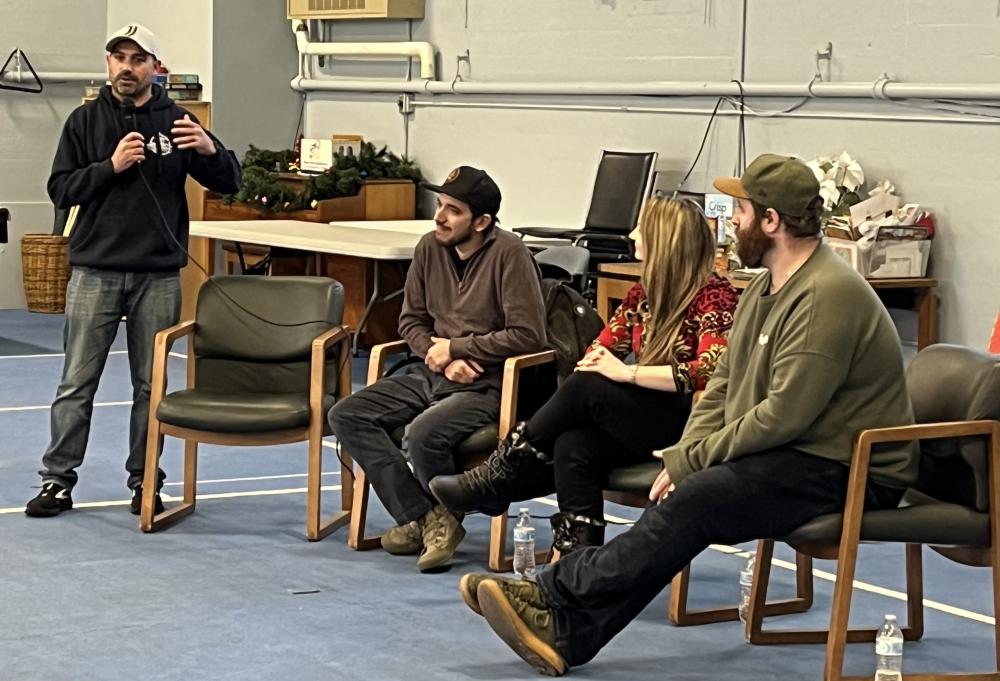COA learns about THC and CBD in cannabis presentation
Dee Homer has heard all about the soothing effects of cannabis.
That’s why she attended a panel discussion about the plant’s health benefits at the Council on Aging on Wednesday, Dec. 14.
She wanted to learn about how cannabis can decrease pain and aid sleep. However, she has a family member who smokes marijuana and still seems miserable.
“I know there’s lots of pots,” she told Trade Roots cofounder Jesse Pitts and his panel of “industry professionals,” “but he’s not smoking the right pot.”
Pitts said that the marijuana Homer’s relative smokes is not as well-regulated as what can be found at his establishment.
“Tell him to go to Trade Roots,” he told her.
Over 60 people, seated at tables decorated with poinsettias, glittering miniature Christmas trees and laminated place mats emblazoned with Santas, snowmen and caroling woodland creatures, attended the discussion. For those who attended, everything at Trade Roots was 50% off that day.
“I think it’s wonderful that a generation who was raised under the War on Drugs is now open to exploring using cannabis products,” said Trade Roots cofounder Carl Giannone. “Everyone’s been very receptive.”
Giannone was stunned by the turnout. Ruben Marques and Julie Mejia, who both spoke at the event, were not.
“This is the demographic that benefits the most from it,” said Marques, founder and CEO of the Boston-based hemp and CBD company Erva Herb. “I want to make this plant and everything about it more accessible. It’s all about educating and making it less scary for them.”
Once they actually try cannabis products, he said, they are no longer scared.
“This population is finally starting to look for alternatives to traditional pharmaceuticals,” said Mejia, founder and CEO of Holistic Hemp Solutions, “and I think people are getting more open-minded about it.”
“I think a lot of the elderly population still have a stigma in their minds that marijuana is marijuana from the days of Woodstock,” said Council on Aging Chair Jody Santagate. “Back in their day, there was a bit of a taboo behind it. It was illegal! But days have changed. There are so many benefits to help them with their day-to-day lives.”
Marques explained the difference between hemp and cannabis. They are different species of the same plant, so the law classifies them differently. Hemp has less than .3% THC content, so it has no psychoactive effects.
“Only now are we beginning to understand CBD and TCH,” he said. “We still have a lot to understand about their benefits and how they work... It can feed us, it can clothe us and of course the medicine is important.”
Cannabinoids, compounds found in cannabis plants, have many uses that go beyond the recreational.
“If you were a car, so to speak, THC is kind of the gas that makes you go,” said Trade Roots laboratory director Spencer Holleran, whose job it is to extract THC from cannabis plants. “Cannabinoids are the steering, and without that, you’re not going to go where you want to go... It’s all of these things that work together.”
Marques said that cannabis can be eaten in food (commonly referred to as “edibles”), topically applied or taken in capsule, inhaler, vaporizer and even beverage form.
“It’s not just smoking a joint anymore,” he said.
After speaking, Marques and his fellow panel members took questions from the audience.
“Do you sell bongs?” Someone asked.
The audience laughed.
“We do sell water pipes,” Giannone replied.
75-year-old Marie Riley, who successfully used CBD oil to treat a hand injury, wanted to know more about how cannabis could help her sleep.
“Edibles will generally have a longer-lasting effect,” Holleran told her. “That’s why people will overconsume edibles, because they don’t realize how potent the THC is until their body has metabolized it.”
Holleran also warned that excessive use of cannabis products could cause dizziness and anxiety.
“Unfortunately a lot of people learn the hard way,” he said, “but we don’t have to.”
An 81-year-old woman, who attended the discussion and wished to remain anonymous, learned the hard way. She was at a friend’s house when she discovered peanut butter cookies — her favorite — in the fridge. After eating them, she felt tired and dizzy.
“You didn’t eat the cookies, did you?” Her friend asked her.
The cookies turned out to be edibles.
“It was the first and last time I got involved with that!” The woman said.
87-year-old Sharon Frank, who is a member of the Council on Aging Board of Directors, said that Trade Roots has a responsibility to educate the community about cannabis.
“I’d like people to be aware of what their products have and how they can make their lives easier,” said Frank, who was wearing a sweater with the words “I wish I was a teddy bear” on it. “I think they have the ability to make people’s lives a lot more comfortable.”















